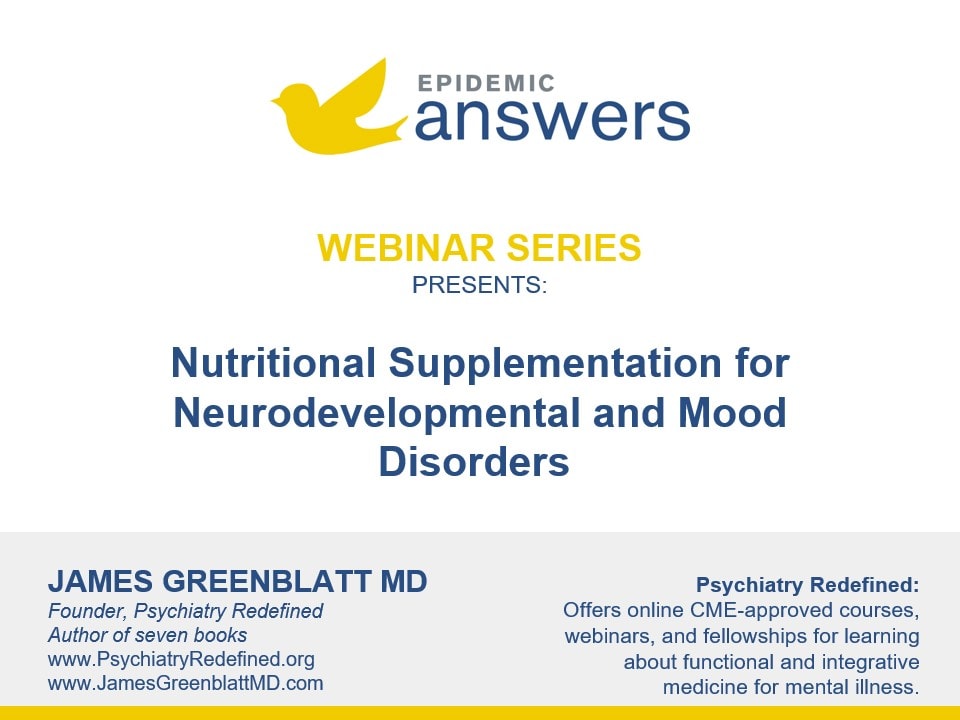In this blog post, Kelly Dorfman, MS, LND, offers advice for nutritional supplementation and autism, ADHD, SPD and other developmental delays.
Children who are distractible or have developmental delays need more nutrients than non-affected youngsters. The higher nutritional needs may be due to one or more of the following:
- Poor absorption due to gastrointestinal issues, gut dysbiosis and/or food sensitivities and intolerances;
- Self-restricted diets during critical developmental periods;
- Impaired ability to detoxify environmental chemicals and pollutants;
- Nutrient deficiencies passed on from their parents.
Parents are justifiably alarmed when a child is eating poorly despite assurances many physicians offer. Poor nutrient intake can decrease intelligence and affect brain functioning, especially if it occurs during the first few years of life.
Unfortunately, these indisputable facts are not enough to convince children to eat their whole foods and especially vegetables. The best most parents can do is offer consistently good choices and eliminate heavily processed, artificially colored and flavored foods.
For those who have successfully removed junk foods from the family diet, what is left is often processed starches and fruits. Many are afraid to try to adjust the menu further, no matter how unbalanced, for fear that children will eat nothing. One mother of a two year old with a pervasive developmental disorder reported that her son ate only custard, rejecting every other food.
Can Supplements Help?
One logical step is to close nutritional gaps with the therapeutic use of supplements. Nutritional supplements are widely available, but their use in children is not well understood and can be intimidating.
Doctors often confuse the situation further by expressing concern over the potential toxicity of vitamins. In fact, vitamins have a long history of safe and efficacious use with the notable exceptions of fat soluble Vitamin A and iron. Both can be toxic and should be used with caution and under supervision.
Discuss your dietary supplement program with a doctor or other knowledgeable health professional. The right person can help you develop a good balance of nutrients for your individual situation.
An easy place to start is with a multiple vitamin with at least two or three times the recommended daily allowance (RDA) of B vitamins with added trace minerals. A calcium and magnesium supplement might also be considered, especially if milk products have been reduced or eliminated.
Minerals should not be taken in amounts larger than RDA without good reason. Unlike vitamins, they are not broken down or excreted when taken in excess. Commercial vitamin formulas for children tend to be too low in minerals except iron; when using adult minerals, exercise caution.
Finding the right nutrient balance is an art, which is why it is important to work with a knowledgeable practitioner to determine which supplements and what dosage is beneficial.
Most vitamins and food factors such as di-methyl glycine (DMG) and pycnogenol are very safe, so the levels can be adjusted to fit the child’s needs. DMG has been shown to improve language output, but can also increase self-stimulatory behavior.
In general, children become irritable if given too much of a supplement. In addition, giving a child too many supplements at one time, especially in the morning, can upset their stomachs.
How to Get Your Child to Take Supplements
Once supplements have been decided upon, the next step is figuring out how to deliver them into the body. Many children find it difficult to swallow pills. Some parents have found they can successfully hide the contents of pull-apart capsules in juice, but this can leave a gritty residue that many children reject.
Another alternative is putting a supplement formula in a liquid base such as applesauce. You could also look into finding a compounding pharmacy near you that can mix the supplement blend into a more-palatable form for your child. This is an excellent option if your child’s practitioner recommends taking a large number of supplements, as is common for children with autism or for those taking a “mito cocktail.”
About Kelly Dorfman MS LND
Kelly Dorfman is one of the world’s foremost experts on using nutrition therapeutically to improve brain function, energy and mood. Kelly’s special talent for integrating information from many sources and finding practical solutions has made her a popular speaker and workshop leader. She lectures extensively and is a member of Platform (formerly the National Speakers Association) and has been featured on numerous television programs including CNN’s American Morning.
Kelly’s award winning book, Cure Your Child With Food: The Hidden Connection Between Nutrition and Childhood Ailments (formerly known as What’s Eating Your Child) was given rave reviews by Publishers Weekly and the Washington Post.

As a go-to expert on nutrition issues, Kelly is frequently interviewed and quoted in the media. She has been featured in articles in The Wall Street Journal, Parade, Bethesda magazine, Living Without magazine, and the Huffington Post.
Kelly holds a master’s degree in nutrition/biology and is a licensed nutrition dietitian. She is a co-founder of Developmental Delay Resources, which has merged with Epidemic Answers. You can find out more about Kelly and her practice at kellydorfman.com
Still Looking for Answers?
Visit the Epidemic Answers Practitioner Directory to find a practitioner near you.
Join us inside our online membership community for parents, Healing Together, where you’ll find even more healing resources, expert guidance, and a community to support you every step of your child’s healing journey.




